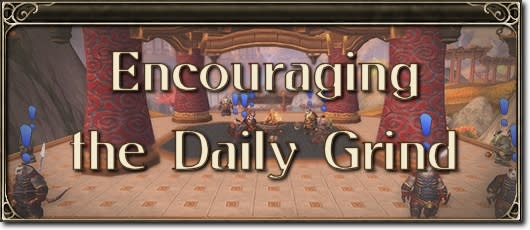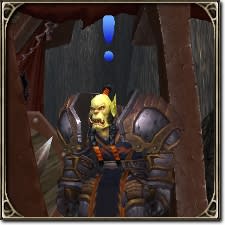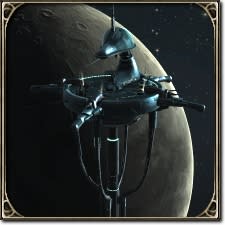MMO Mechanics: Encouraging the daily grind
I've written before about how developers use clever mechanics to lower the barrier to entry in order to encourage more people to play MMOs, but how do they keep players interested after they have rolled a new character? More often than not, MMOs greatly benefit from hanging onto players for as long as possible, so encouraging regular play is a massive priority for development teams. As a genre that thrives on creating a connected and dynamic community, MMOs are strengthened by keeping up the number of players that log in daily. This also encourages longevity since players make meaningful connections with the people they are linked to through daily play.
Utilising daily quests, creating an ongoing need for crafted equipment, and necessitating the farming of materials for the good of the collective are all very accessible ways to encourage players to log into their favourite MMO world on a regular basis. As useful as developers may find them, though, the appeal of repeatable daily content is hotly debated by MMO players. For some, low-octane daily content is a brilliant way to unwind that doesn't require a regimented schedule to complete, but many others find the repetition inherent in some daily content tiresome and uninspired.
In this week's MMO Mechanics, I'm going to look at the various applications of daily content in today's MMOs while weighing up the pros and cons of several of these techniques.
Basic daily questing in themepark MMOs
The most immediately obvious daily content delivery employed by themepark MMOs is the basic daily quest system seen in games like World of Warcraft. The concept behind daily quests is very simple: Characters are presented with a list of repeatable quests to complete on a daily basis, and the rewards are typically in the form of faction reputation gain or gear-earning currency. This allows a very diverse set of players to gain tangible progression in the form of new loot without having to commit to regular group activities like dungeon delving, raiding, or PvPing.
Longevity isn't attractive only to subscription-based MMO creators. It stands to reason that players who revisit a game regularly are more inclined to splash their hard-earned money on cash-shop items. The developers behind Runes of Magic, for example, have encouraged such spending while also incentivising regular play by giving players Phirius Token Coins, an Item Shop currency, as a reward for completing daily quests.
The daily grind is not just a regular Massively feature
On the surface, this presents both players and developers with a very good deal; players are rewarded for playing regularly but still retain autonomy over the time or duration of that play, and developers can create content that doesn't get burned through quickly and appeals to a wide range of players. Whether you are a player with little time on your hands who can play only sporadically or a raider in need of gear to patch up weak slots that are not yet filled with those rare raid drops, daily quests can provide an answer to your MMO conundrum.
In its basic execution, however, daily questing makes some players switch off the minute content feels repetitive or lazy. Gear and reputation grinds should be just as well disguised as the leveling grind, but this can be particularly hard to achieve when the content in question is intended to be repeated so regularly. Nobody wants to feel forced into running daily content, either, so if the balance between regular play and gaining rewards depends on unfaltering daily commitment, then players will vote with their virtual feet.
Daily content with a difference
Players are justified in worrying about being forced into repetitive daily quest grinds, and themepark MMO developers have been increasingly careful when designing this content in an attempt to minimise the problem. Neverwinter and Guild Wars 2 developers have attempted to refresh the basic daily quest format by adding diversity and choice to the usual mechanical mix. Rather than ask players to complete very strict objectives in one area to reach daily targets, both games strive to give you more choice over which daily content you complete.
In Neverwinter's case, Astral Diamonds can be earned through daily Foundry missions, daily PvP domination and skirmishes, and daily dungeons, meaning that players can earn the same auction house currency no matter how they choose to play. Guild Wars 2 features a choice of daily achievements to complete each day from which the player selects five to gain the daily reward chest, and also special daily achievements that are dependent on the living story.
While choice certainly helps to alleviate the potential monotony of grinding daily content, many of these systems revolve around the same core set of quest mechanics that players have come to expect from themepark MMOs. Since players tend to have their personal favourites in terms of quest style, some people may find that they continually rely on running the same sort of content each day despite the apparent choice on offer.
Sandboxes like to encourage daily dedication too
Daily chores aren't restricted to the typical themepark MMO grind. Sandbox MMO EVE Online encourages its players to log in regularly with a number of time-based mechanics. Skills in EVE train in real time, even when you are offline, so you have to log in when your current skill is due to finish in order to prevent wasting valuable training time. Skills can be queued to start training up to 24 hours in advance, allowing lots of small skills to be queued together. This means players will need to log in at most once in any 24-hour period to queue new skills, and those training skills that need more than a day to complete can require more time between skill management sessions. The time-based nature of skills can be quite offputting for new players, however, as they cannot simply catch up on longstanding players through normal play.
Starbases must be regularly fueled, silos need to be refilled and emptied, and materials require hauling from A to B in order to keep EVE's industrial machine churning. Planetary interaction has a similar mechanic, requiring that players log in periodically to scan for materials and restart extractors to secure the materials for production. Aside from the realism of industry, EVE's required in-game maintenance ensures that players continue to dip at least a fleeting toe into the sandbox environment where spontaneous interaction between other players might capture their attention and turn that maintenance time into a full play session.
This event-based attraction is the most obvious advantage of EVE's regular chores; more time logged in means more opportunity to stumble upon an interesting sandbox adventure. It also keeps people connected to in-game organisations and friends, so impromptu PvP events or wormhole operations won't be missed due to inactivity. Realistic economy balancing can unfortunately make EVE feel like a full-time job. This is a major, widely repeated criticism of the game since a lot of this maintenance takes up quite a bit of time and such interesting events can be few and far between.
Dailies don't have to be a chore, and developers are increasingly aware of how tedious grinding dailies can become if they are poorly executed. Many hardcore raiders are happy to complete daily quests in order to fully engage in the raiding experience since daily completion can equate to additional boss kills, but daily tasks also appeal to those with a limited amount of time to play since they do not demand much time or present a significant barrier to entry.
For others, grinding dailies has very little appeal and feels like a job in itself, making it important for developers to make daily quests both sensibly rewarding and entirely optional to prevent this camp of players from losing their drive to play. Despite this, sandboxes benefit greatly from getting players to log in regularly to ensure they interact with unexpected exciting events led by the playerbase. Without engaging in these events, sandbox communities can feel very insular, and the game can appear slow and boring.
Whether you are queuing your skills in EVE Online or readying your character for raiding by running daily dungeons in WoW, simply being present can be enough to secure your place in massive battles or guild events that you would otherwise have missed. Barriers to entry should be low to encourage a large initial playerbase, but the most successful MMOs have learned how to keep us interested in the game's ever-changing community, effectively raising the barrier to exit and granting these titles longevity.

MMOs are composed of many moving parts, but Massively's Tina Lauro is willing to risk industrial injury so that you can enjoy her mechanical musings. Her column, MMO Mechanics, explores the various workings behind our beloved MMOs every Wednesday.







